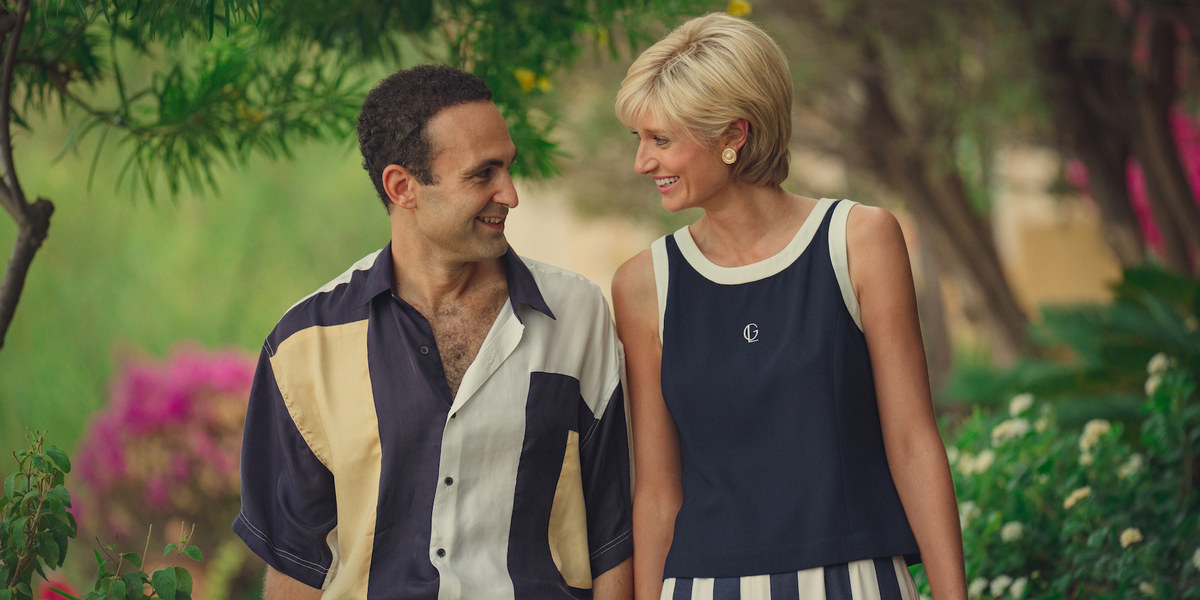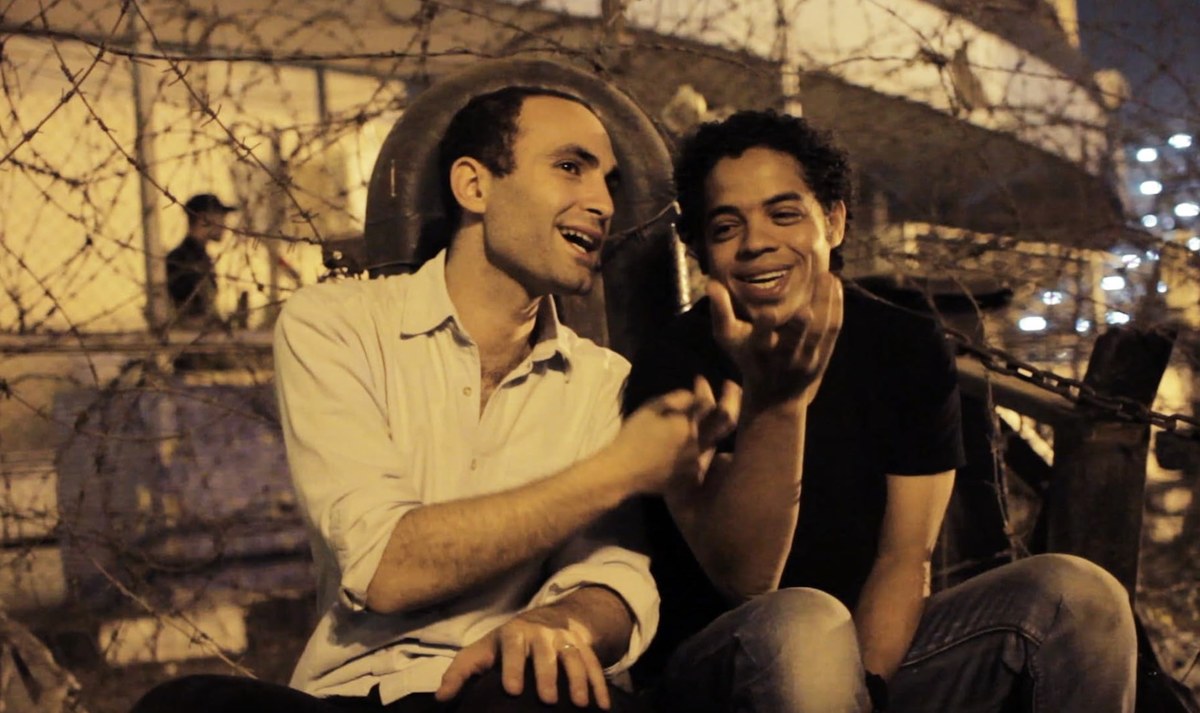Egyptian-British actor Khalid Abdalla on his portrayal of Dodi Al-Fayed and smashing stereotypes
DUBAI: Like many around the world, Egyptian-British actor and activist Khalid Abdalla can remember exactly where he was on the morning of Aug. 31, 1997.
“I was in Edinburgh, where I did my first play at 16. I woke up and there were lots of people around a TV. I just remember feeling that the right thing to do was to avert my gaze,” Abdalla tells Arab News from his base in London.
The TV was showing the aftermath of the car crash in Paris in which Princess Diana, the former wife of then-Prince Charles, and her new partner, Egyptian movie producer Dodi Al-Fayed, died, sending shockwaves around the world.
“I watched the funeral,” Abdalla continues. “I remember seeing the kids, and crying at that moment. But from that point forward, I really didn’t follow royal news. But then, eventually, it came for me.”
What came for him was the role of a lifetime: portraying Dodi Al-Fayed on the wildly popular Netflix series, “The Crown,” which follows the life and reign of the late Queen Elizabeth II. It’s a part that Abdalla, who appears in seasons five and six, really wasn’t chasing, but, in hindsight, maybe the universe was trying to tell him something.
“In London, I kept seeing buses with ‘The Crown’ adverts, and I thought, ‘Are they going to get to Diana and Dodi?’ And the thought crossed my mind: ‘They’re going to come asking. I’d be terrible. No, no, no, I’d be the wrong person.’ For one thing, I knew nothing about Dodi.”
As it turns out, Abdalla was exactly the right person to play reserved and gentle Dodi, the eldest son of Harrods owner Mohamed Al-Fayed, who died this year, just one day before the 26th anniversary of his son’s death.

Abdalla has been widely praised by critics and fans for giving Dodi a compelling emotional complexity that humanized him. The actor says there were certain parallels to draw on from his own life.
“I have a very charismatic father — though he is not at all like Mohamed Al-Fayed. But I certainly understand the relationship with a charismatic father,” he says. “I’m very different to Dodi, that’s for sure, but I’m shy too; there are aspects of energy that we share. There are people I’ve met who knew him, who feel a resonance between us.”
There’s a poignant scene in the first part of season six, when the bereaved Mohamed realizes Dodi is hardly talked about in the British press, and that the royal family offered him no condolences. “Is it the fate of Arabs to always be hated by the West?” he asks. It’s a line that still feels relevant in 2023.
“One of the things that makes me proudest about this role is that, finally, people will get to know Dodi, love him, and mourn him,” said Abdalla. “I think one of the realizations that came to me in a very strong way, in the context of everything else that’s going on in the world, was asking myself, ‘How many Arabs can I think of in cinema on this side of the world, who you get to know and love — not fear — so that when they die, you mourn them?’ I can barely think of any. People can’t even see that there is some sort of restitution going on here. I find something in healing that wound that’s not just about him. I think it’s about all of us.”

The real Dodi was a private person who rarely gave interviews. But he was often photographed with famous women, conjuring an image that wasn’t entirely accurate.
“The only thing I knew about Dodi was, like everybody else, this word ‘playboy,’ which gives the impression of a Hugh Hefner type,” Abdalla says. “When you get someone with a lot of money going from relationship to relationship, a tabloid is going to throw the word ‘playboy’ in. But in terms of who he really was, that’s just not fair or accurate.”
Abdalla felt a responsibility to tell Dodi’s story the right way. He went into research mode, delving into articles and detailed CCTV footage of Dodi and Diana’s last day. He even spoke with some of Dodi’s friends. “I had no idea at the beginning quite how much I would love playing him, and the extent to which he would be a gift to me,” he says.
And Abdalla has used his raised profile — which includes a nomination for Best Supporting Actor at the Critics Choice Awards — to ensure that his own voice is heard. At the season six premiere of “The Crown” in November, as the Israel-Hamas war raged, he wrote “Ceasefire Now” on his palm, knowing that the event’s red-carpet photos would be shown around the world. He says he was “afraid” of making the gesture, but “so pleasantly surprised to find the number of people who were supportive of it,” adding that he “hoped it would embolden others to do the same.”
On Dec. 5, at the show’s “Finale Celebration” at London’s Royal Festival Hall, he doubled down, holding up his hands for the paparazzi and displaying the words “Return the hostages” and “End the Occupation.”
Abdalla’s passion for activism has been passed down through generations of his family. “Both my father and grandfather were political prisoners on the left in Egypt,” he says. “There are generations of political trauma (among) friends and family who have paid the price of fighting for a better world.”
Abdalla grew up in the UK, and says he possibly “underestimated the level of racism that exists in (that) society,” perhaps because he “grew up able to ‘pass’ very successfully.”
“It wasn’t really until I left university in 2003 that I encountered how profoundly different the way I was was seen, and how that would affect everything else in my life from that point forwards,” he continues. “I’m certainly someone who exists in between two very powerful and important cultural heritages. I have been on a very big journey with that: At one stage of my life afraid that I would lose my Arab heritage and that I wouldn’t be able to hand it to my children.”
That changed, he says, when he spent eight years living and working as a producer and actor in Egypt — from 2008 to 2016, a “hugely profound” time for him.
“The beauty of being in the film industry — or in culture in general — in the Arab world is that you have a real series of causes to fight for and responsibilities to live up to,” he says.
The racism demonstrated by the press in its coverage of Dodi in the Nineties is still present today; there is still “a dehumanizing way of looking at Arabs in general,” Abdalla suggests.
“I cannot accept that my children, who are now six and seven, will be in the same position I am in 30 years from now. I cannot accept that this goes on for another generation. And the only way for that to not happen is to actually have the conversations we need to have and make the cultural and political space for those conversations to happen,” he says. “I could not step onto a red carpet and allow myself not to be seen with the fullness of who I am. I don’t want to hide anymore.”

